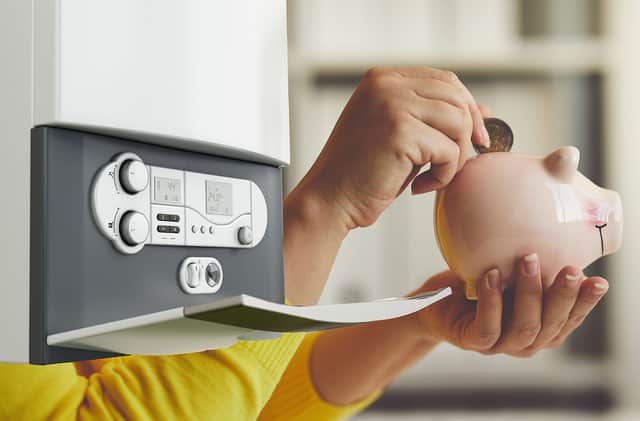Simple change to boiler settings could save households £112 a year as energy bills set for huge rise
and live on Freeview channel 276
Households are being urged to make a simple change to their boiler settings to save more than £100 a year.
Money-saving charities Nesta and Which? have launched a campaign with energy firms EDF, E.ON and Octopus Energy to help people save money on bills this winter.
Advertisement
Hide AdAdvertisement
Hide AdNesta - the charitable body behind The Money Saving Boiler Challenge - says that households using combi boilers should adjust the ‘flow temperature’ from 80C to 60C or below to make a saving of around £112 a year.
Turning down the boiler temperature flow on a combi-boiler – the temperature which your water heats up to, before circulating round the radiators in your home – can save on both energy bills and carbon emissions, and it works more efficiently if it is to 60C.
Changing the flow temperature will not affect the temperature of the hot water from your taps, Nesta says. Instead, it means your boiler will be in ‘condensing mode’ and will recover heat that would otherwise be lost.
The boiler flow temperature is different to your thermostat and is generally controlled by a dial or buttons on the front of the boiler.
Advertisement
Hide AdAdvertisement
Hide AdPeople who run their boiler at a lower temperature will need to leave the heating on for longer - around 15 minutes - to heat up their homes, Nesta said.


While many households may have lowered their thermostat in a bid to save on heating bills, the charity said many people are unaware they can save money by reducing their boiler’s flow temperature.
In addition, ONS data shows only one in 10 people had lowered their flow temperature in the last year, compared to six in 10 who had lowered their thermostat.
Nesta says if its target 10 million households took part in the Money Saving Boiler Challenge, a total of £1 billion could be wiped off UK energy bills, while 1.7 million tonnes of carbon emissions could be saved.
Advertisement
Hide AdAdvertisement
Hide AdSince the challenge launched in October last year, more than 200,000 have taken part and turned down their boiler flow temperature to 60C or below.
Katy King, deputy director of Sustainable Future at Nesta, said: “Many people who are worried about paying their bills this winter will find it reassuring to get advice directly from the government that could save them around £112.
“We are pleased that the government is helping to get the message out that lowering combi boiler flow temperature is a simple step that people can take to lower their energy bills by using our tool.
“Anyone concerned about the cost of living can now go to the Help for Households pages on Gov.uk to find a range of tips on saving energy and getting support.
Advertisement
Hide AdAdvertisement
Hide Ad“If 10 million UK households with combi boilers reset their flow temperature to 60 degrees or below, this would cut people’s bills by a total of £1 billion a year.”
The money saving tip comes as households brace for a £500 hike in energy bills next month as the government’s support for households becomes more limited.
Ofgem is lowering its energy price cap – the amount suppliers are able to charge – from the current £4,279 per year to £3,280 for the average household, effective from April 1, to reflect recent falls in wholesale energy prices.
The £3,280 figure indicates how much consumers on their energy suppliers’ basic tariff would pay if the government’s Energy Price Guarantee (EPG) was not in place.
Advertisement
Hide AdAdvertisement
Hide AdBut customers will pay about 20% more on their bills – approximately £500 – as the government’s EPG becomes less generous from the beginning of April, leading to an average bill of £3,000.
When the upcoming end of the £400 energy rebate scheme – paid in six instalments of £66 and £67 a month – is factored in, the energy cost for households will increase even more.
Comment Guidelines
National World encourages reader discussion on our stories. User feedback, insights and back-and-forth exchanges add a rich layer of context to reporting. Please review our Community Guidelines before commenting.
